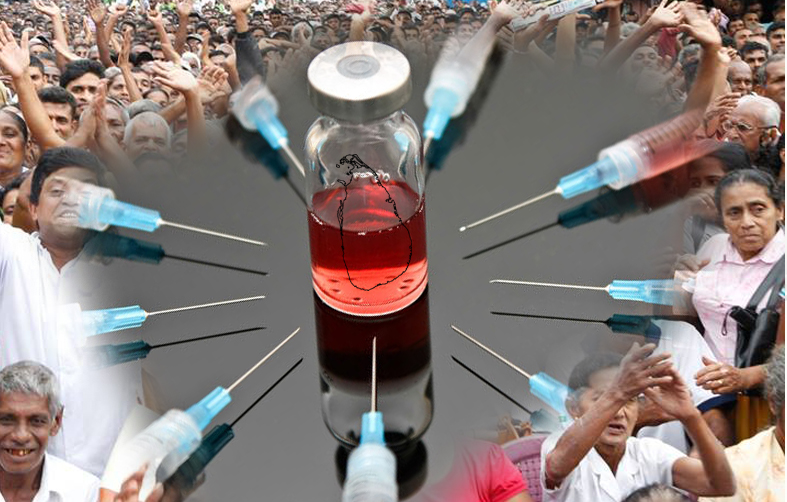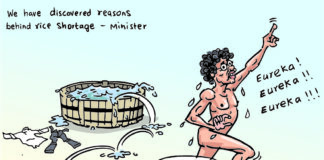It was former United States President Ronal Reagan who famously observed that politics is said to be the second oldest profession but that it bears a striking resemblance to the first. The pandemic politics that the government is engaged in, in the midst of a deadly health crisis that is threatening to cost thousands of Sri Lankan lives reminds us of Reagan’s words.
Last year, when the corona virus pandemic first hit Sri Lanka, President Gotabaya Rajapaksa was among the first leaders to close the borders of a country. The government rigorously imposed a lockdown. That ensured that the deadly virus was kept at bay for a good nine months.
It also ensured that President Rajapaksa’s Sri Lanka Podujana Peramuna (SLPP) won handsomely at the twice postponed general elections. There is nothing wrong with that: the President did his duty by the nation by protecting it against the pandemic when many other leaders failed to do so. It was similar to elder brother Mahinda being rewarded with a similar victory at the 2010 general elections after winning the Eelam war. Even if President Rajapaksa was playing politics then, it was for a just cause.
In the subsequent stages of the pandemic, many actors dabbled in politics. Health Minister Pavithra Wanniarachchi played to the gallery by partaking of a potion concocted by a charlatan. She got more than the publicity she bargained for, making international headlines when she herself fell ill with Covid-19.
Then, presidential first cousin Udayanga Weeratunga, a fugitive wanted by Interpol until recently, was given the greenlight to bring down tourists from Ukraine, at that time teeming with corona virus infections. One cannot fathom what benefit that would have brought to Sri Lanka.
Now though, the full force of the pandemic is upon us, thanks to the lackadaisical attitude adopted by the government from late last year. When the ‘second wave’ emerged, the government refused to own up to it, fearing it would tarnish the reputation of the powers that be. Instead of being transparent about it and stamping out the second wave, we were fed fairy tales of there being no ‘community transmission’, only clusters in Minuwangoda and Peliyagoda!
President Rajapaksa and his government appear obsessed with protecting the “economy”- even if it comes at the cost of many Sri Lankan lives. As a result, at the time of writing, with the very real prospect of thousands of deaths looming in the next few weeks, the government has refused to budge and its spokespersons keep repeating there will be no lockdown.
It is rarely that the three leading medical professional bodies in Sri Lanka join forces. Now they have. The Sri Lanka Medical Association, the Association of Medical Specialists and even the pro-government Government Medical Officers’ Association spoke in unison this week demanding a lockdown, warning of dire consequences, if this was not done. All they got was restriction on inter-provincial travel. A day later, as the pressure on the government grew, a night time curfew was added on. This is obstinacy at its worst, simply because neither the President, Covid Task Force Chief (and Army Chief) General Shavendra Silva or anyone else wants to admit that they got it wrong.
There was more politics at play, even at a local level. The Piliyandala area was placed under a lockdown after its Medical Officer Health, in consultation with the relevant authorities noted a sharp rise in corona virus infections. Enter Gamini Lokuge, local strongman of the area who considers himself above the law, especially when he is on his home turf. He influenced authorities to lift the lockdown barely eight hours after it was enforced. Now, the case numbers there have risen exponentially. Should some of them succumb to the virus, Lokuge will surely have blood on his hands.
Then there is the sordid saga about the vaccines. The government was busy doing research on charlatan Dhammika’s concoction when the rest of the world was hurriedly placing orders for corona virus vaccines, knowing very well that demand will by far outstrip supply. To add to the chaos, the pundits making decisions could not do the simple arithmetic of dividing the number of vaccines by two. So, they gave the first dose of the Astra Zeneca vaccine to too many people (so they could say we vaccinated this many) and are now left short of vaccines for the second dose- and are now doing further research on mixing and matching vaccines. It is laughable, if not for the fact these decisions have deadly consequences!
There was more bungling on the vaccine issue. In a bid to appease growing public anger, the government turned to its only ‘friend’, China, to obtain more of their Sinopharm vaccines. Beijing obliged. However, there was a catch: Sinopharm had not been approved by the World Health Organisation (WHO) for emergency use. The government asked the local National Medicines Regulatory Authority to approve its use. The doctors there, respected professionals, refused to do so without the relevant data which wasn’t readily forthcoming. The government then sacked several NMRA members and replaced them with others!
That was not all. A few days ago, it was announced that the WHO approved the Sinopharm vaccine for emergency use. Jumping on the bandwagon was Kingsley Ratnayake of Sirasa fame who had recently become His Master’s Voice as the presidential media spokesman. In his first task in his new job, Kingsley said that “As a result of a discussion President Gotabaya Rajapaksa held with the Director-General of the WHO via Zoom last Friday, the WHO on the same evening approved the emergency use of the Sinopharm vaccine”.
The rebuttal from the WHO was prompt and brutal. It pointed out that the WHO process took several months to complete and added that countries made their own decisions about using vaccines. Sri Lanka maybe on the cusp of its worst health crisis in a century but nothing stops the President from trying to score a brownie point with the public.
At the beginning of the pandemic, the President boasted that he dealt with issue as best as he can but he is now playing politics with the pandemic. If this is his best, we shudder to think what anything less would be like. Unfortunately, it is the average citizen who pays the price- with their lives.





